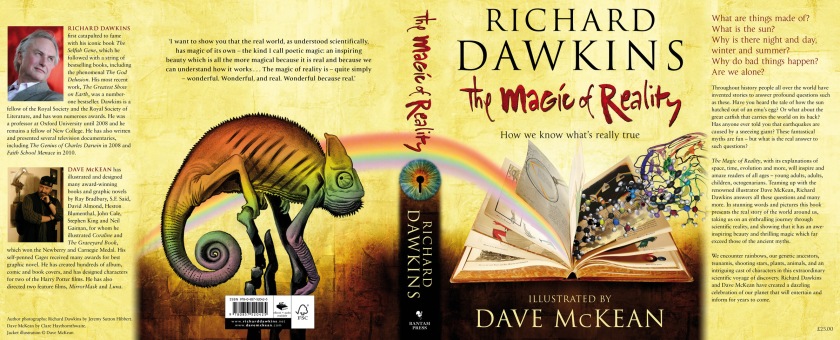

Richard Dawkins is an English evolutionary biologist, author and professor at Oxford University. His seminal work is The Selfish Gene (1976), which popularised the gene-centred view of evolution and introduced the term meme. His book, The Magic of Reality (2011), really fascinates me!

PDF extracts:
¶ pp. 12-13 from ‘The Magic of Reality’ (Dawkins, 2011)
¶ pp. 32-52 from ‘The Magic of Reality’ (Dawkins, 2011)
¶ pp. 118-139 from ‘The Magic of Reality’ (Dawkins, 2011)
¶ pp. 246-265 from ‘The Magic of Reality’ (Dawkins, 2011)
Here are some more of his books:



Richard Dawkins
Climbing Mount Improbable
How could such an intricate object as the human eye – so complex and so precise – have come about by chance? In this masterful piece of popular science, Richard Dawkins builds a powerful and carefully reasoned argument for evolutionary adapatation as the force behind all life on earth. The metaphor of ‘Mount Improbable’ represents the combination of perfection and improbability that we find in the seemingly ‘designed’ complexity of living things. And through it all runs the thread of DNA, the molecule of life, responsible for its own destiny on an unending pilgrimage through time.
Science in the Soul
This book is a series of essays and letters written by Dawkins. Topics range from evolution and Darwinian natural selection to the role of scientist as prophet, whether science is itself a religion, the probability of alien life in other worlds, and the beauties, cruelties and oddities of earthly life in this one. Critics have said that this collection is a, “sparkling showcase for Professor Dawkins’ rapier wit and, the beauty of his prose.”
Unweaving the Rainbow
Keats accused Newton of destroying the poetry of the rainbow by explaining the origin of its colours. In this text, Dawkins argues that Keats could not have been more mistaken, and shows how an understanding of science enhances our wonder of the world. He argues that mysteries do not lose their poetry because they are solved: the solution is often more beautiful than the puzzle, uncovering even deeper mysteries. Dawkins takes up the most important and compelling topics in modern science, from astronomy and genetics to language and virtual reality, combining them in a landmark statement on the human appetite for wonder. This book has been labeled:
A dazzling, passionate polemic against anti-science movements of all kinds.


The Greatest Show on Earth: The Evidence for Evolution
Charles Darwin’s masterpiece, On the Origin of Species, shook society to its core on publication in 1859. Darwin was only too aware of the storm his theory of evolution would provoke but he would surely have raised an incredulous eyebrow at the controversy still raging a century and a half later. Evolution is accepted as scientific fact by all reputable scientists and indeed theologians, yet millions of people continue to question its veracity. In The Greatest Show on Earth Dawkins, like a detective arriving on the scene of a crime, sifts through fascinating layers of scientific facts and disciplines to build a cast-iron case: from the living examples of natural selection in birds and insects; the ‘time clocks’ of trees and radioactive dating that calibrate a timescale for evolution; the fossil record and the traces of our earliest ancestors; to confirmation from molecular biology and genetics.
The Blind Watchmaker
Acclaimed as the most influential work on evolution written in the last hundred years, The Blind Watchmaker offers an inspiring and accessible introduction to one of the most important scientific discoveries of all time. A brilliant and controversial book which demonstrates that evolution by natural selection – the unconscious, automatic, blind yet essentially non-random process discovered by Darwin – is the only answer to the biggest question of all: why do we exist?
The Four Horsemen
This is an edited work. Known as the ‘four horsemen,’**** these four big thinkers of the twenty-first century met only once. Their electrifying examination of ideas on this remarkable occasion was intense and wide-ranging. Everything that was said as they agreed and disagreed with one another, interrogated ideas and exchanged insights – about religion and atheism, science and sense – speaks with urgency to our present age.

The dialogue was recorded, and is now transcribed and presented in this book. Questions they asked of each other included: (1) Is it ever possible to win a war of ideas? (2) Is spirituality the preserve of the religious? (3) Are there any truths you would rather not know?
Notes
**** “The Four Horsemen of the Apocalypse”
The Four Horsemen of the Apocalypse are described in the last book of the New Testament of the Bible (the Book of Revelation). According to the main modern interpretation, this prophecy describes a period of time when a quarter of the population of the earth would be killed by a combination of wars, famine and disease. It is the precursor to the myth of armageddon.

Apocalypse
— The complete final destruction of the world, as described in the biblical book of Revelation.
— An event involving destruction or damage on a catastrophic scale. “The apocalypse of World War II.”
Armageddon
— In the bible, the last battle between good and evil before the Day of Judgement.
— A dramatic and catastrophic conflict, especially one seen as likely to destroy the world or the human race.
“nuclear Armageddon”
